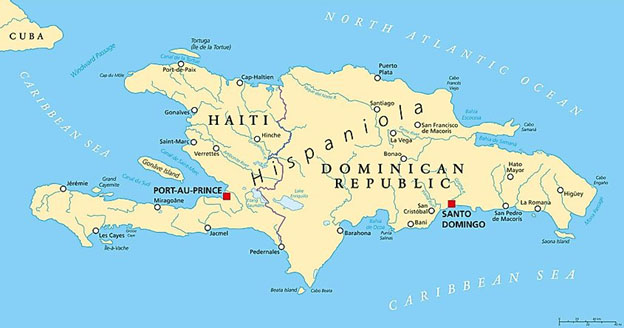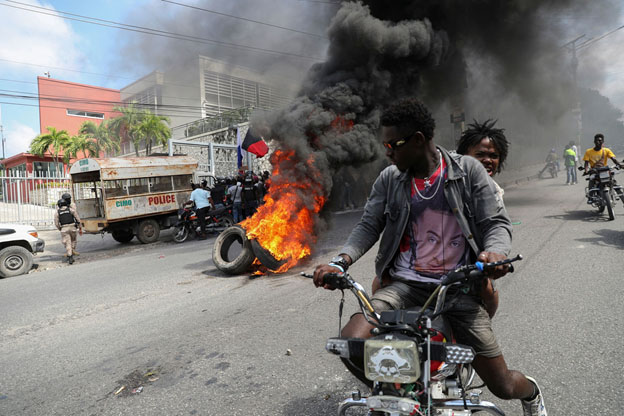As economic and social conditions in Haiti continue to undergo a cataclysmic decline in the face of the collapse of key governance structures, and the replacement of a legitimate political administration with forcibly installed criminal gangs, Haiti has once again reared its head as the Caribbean Community’s ‘tear-away’ delinquent, in the face of mounting evidence that the country’s dire circumstances are, for now at least, outside the ‘control’ of the rest of the Community. Here, it is not a question of engaging in successive rounds of ‘soft’ diplomacy that will lead to the ‘signing off’ by the parties concerned on some kind of remedial arrangement.
Haiti, not for the first time, has opted to ‘sort out’ its internal political differences by having criminal gangs hold sway, for a while at least, and following excursions into the most heinous bouts of bloodletting, returning to a predictable interlude of relative calm under succeeding political administrations that instantly appear as fragile as their predecessors did. Put differently, Haiti’s problems are way above CARICOM’s ‘pay grade.’ What to do about Haiti has become, by far, CARICOM’s most taxing challenging question, the Community’s impotence in the face of an overwhelming ‘family tragedy’ being severe enough to cause the regional movement, more often than not, to keep its distance.
 That said, the implications of the collapse of the governance structure in Haiti and the seeming capture of the state by assorted criminal forces continues to have far more worrisome implications for its next door neighbour, the Dominican Republic [DR], than for its CARICOM ‘kit and kin.’ On the one hand, the ability of the member countries comprising CARICOM to provide any meaningful practical help to Haiti in pursuit of a rolling back of a succession of out-of-control criminal cliques serving as short-term enforcers rather than structured alternative formal political regimes, is out of the question. On the other hand, ‘awkwardly,’ Haiti remains, in name at least, a member of the regional movement.
That said, the implications of the collapse of the governance structure in Haiti and the seeming capture of the state by assorted criminal forces continues to have far more worrisome implications for its next door neighbour, the Dominican Republic [DR], than for its CARICOM ‘kit and kin.’ On the one hand, the ability of the member countries comprising CARICOM to provide any meaningful practical help to Haiti in pursuit of a rolling back of a succession of out-of-control criminal cliques serving as short-term enforcers rather than structured alternative formal political regimes, is out of the question. On the other hand, ‘awkwardly,’ Haiti remains, in name at least, a member of the regional movement.
It is the reality of Haiti’s shared geographic space with the Dominican Republic that becomes the far more pertinent geo-political question whenever the implosion of a political administration in Port-Au-Prince occurs. There is no way that the DR can turn a ‘blind eye’ to the circumstances of its next door neighbour. The DR has, over time, been drawn into Haiti’s never-ending social, economic and political travails by virtue of their shared occupancy of the Caribbean island of Santo Domingo. Over the years, the DR has served as a ‘port’ to rescue fleeing Haitians from its never-ending ferocious political storms. Over time, as Haiti has continued to erupt into its ‘seasons’ of chaos, the knock-on of those circumstances for the DR has become incrementally weightier.
Inevitably the capacity of the DR to shoulder the burden of providing safe spaces and more recently, for Haitians fleeing the chaos of their own country continues to undergo periods of severe testing, to a point where, recently, the President of the Dominican Republic, Luis Abinader seemingly sought to be drawing a line under what, hitherto, had been a preparedness on the part of the DR to accept Haitians fleeing the mayhem of their own country. President Abinader has reportedly recently declared his government’s intention to double down on what now appears to be his government’s policy of authorizing the setting up of refugee camps in the DR to accommodate fleeing Haitians.
The government in the DR has reportedly opted for this course of action, considering the demands of international organizations that have been seeking to persuade the country to cease the expulsion of fleeing Haitians. It appears, however, that President Abinader has struck an ‘enough is enough’ posture. He reportedly stated in a recent interview that his administration will continue to develop and enforce laws related to migration. President Abinader reportedly wants the United States to “act more… They cannot ask the Dominican Republic to solve the Haitian problem. We will not do it, we cannot do it,” he is reported to have said recently.
The issue has become, arguably, the most important item on the United States/Dominican Republic agenda with the President of the Social Christian Reformist Party (PRSC), Federico Antún Batlle reportedly asserting that in the wake of Haiti’s protracted crisis, the United States, Canada and France should open their doors to at least five million Haitians. The DR politician is reportedly on record as saying that the solution to the economic, political, and social crisis that Haiti is experiencing is the responsibility of the “great nations” which now want to try to impose on the Dominican Republic that it receive thousands of Haitians as refugees, a circumstance which he describes as “absolutely unacceptable because our territory is already saturated with citizens from the neighbouring country.”
With Haiti currently in the grip of the most recent of its now political and civil order meltdowns and with the opening of the United States’ doors to the country’s fleeing thousands, it appears that the Dominican Republic is destined to play the role of a long-term ‘minder’ to Haitians fleeing their country’s periodic descent into chaos. Paradoxically, the travails of the CARICOM member country would appear to be far too weighty for the regional movement to carry.






